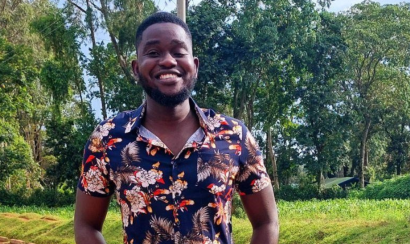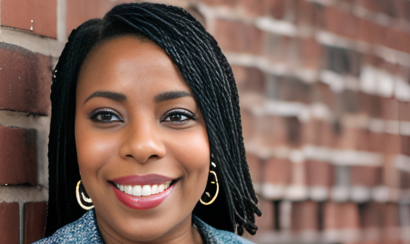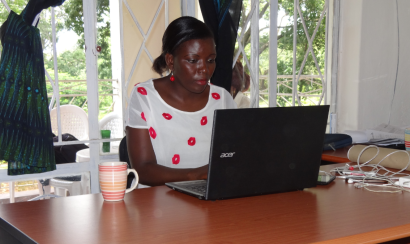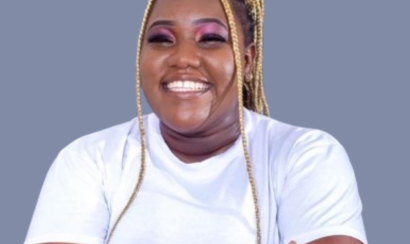In My Own Words: Atieno Cheplemindet
Atieno Cheplemindet, a Senior Strategy Associate, is a design thinking professional with a flair for human-centered problem-solving.

What were your dreams before One Acre Fund?
I’m not sure I had a dream, but I know my parents wanted me to be an engineer, and so I did just that! This later transitioned into occupational safety and environment management, a career move that was triggered by my conviction that we have a moral responsibility to keep people safe in the workplace and protect our environment. This was the beginning of finding my flow, which sits in human-centered design.
How did you end up at One Acre Fund, and why agriculture?
I like to describe myself as a LinkedIn disciple; I got into my first role in One Acre Fund because my LinkedIn page was set up to attract recruiters looking for innovation specialists. I was enjoying my work in innovation at the time and had primed my LinkedIn page towards attracting similar opportunities. The recruiter would later explain that when she was searching for an innovation associate in Kenya with experience in the criteria she had, my profile was among the first three to pop up.
Why agriculture? It's not so much about the industry as it is about giving choices. I'm very passionate about providing African women choices so that they do not have to sit to decide between needs: will I eat, pay school fees or pay for healthcare? These are the choices my father lived with. I remember us visiting my grandmother as a child, and they'd talk about his childhood, and these are the choices my grandparents needed to make.
To me, we need to have a scenario where the rural African woman can say, "I am going to feed my children and take them to school, and I am going to run a business," and so on. The path to actualizing this dream comes in many forms, and agriculture, where smallholder women make the majority, holds the biggest promise right now.
How best would you describe the work you do?
Simply stated, I am the person you call to solve a complex problem, or to restore/turn around a situation. At times, this looks like leading complex projects to drive results towards a strategic priority like implementing a new system to be used across all our countries of operation or could also look like a specific department needs to build or improve a business process to meet certain objectives.
You've spoken a lot about the human experience, and I can't help but relate that to user experience. How do you differentiate those concepts?
I love this question because it frequently applies to my role. User Experience (popularly known as UX) is about how a user interacts with a product, language mostly used in tech/product design and management circles. Customer Experience (CX) focuses on a customer’s experience when they consume a product. I like to think of Human Experience (HX) as a combination of UX and CX and, more, how people — whether a customer, user, or even vendor — experience things.
Now, I mostly use a human-centered design framework to define a problem or integrate it with other problem-solving/process-improvement techniques. An example that comes to mind is one of my goals with the Kenya Business Operations team in a previous project to streamline the print processes to minimize cost per farmer. That's not a project you can plan on an Excel sheet and say, 'now this is how we're going to reduce costs,’ and then roll it out. It also entails influencing behavior change and thinking around systems or how things need to be done. The people who experience a problem the most are an essential part of the design process, and, sometimes, they become part of the design team itself.
What's the most challenging problem you've tackled in your time here?
One of the more intense projects I've undertaken is to build the data analytics unit for our Kenya Business Operations team. Now it's very easy for people at a conceptual level to understand the value of data analytics and how it can drive improvement. It takes work and grit to develop and implement a strategy that defines the value proposition, skills, and structure needed to drive meaningful decisions and results to all stakeholders involved. The challenge for me was managing stakeholders’ expectations and balancing between urgent and important work. That experience taught me a delicate balance between what I call the rapid prototyping of the team and still keeping the bigger picture in focus — that is, using small wins to build towards long-term objectives.
Have you acquired any new skills at the organization?
It has been a steep learning curve. I managed my first team in One Acre Fund, which has led to me leading productive teams remotely, leading complex projects, managing relationships, and very recently Getting-Things-Done. Beyond new skills, I am currently applying my learning around design thinking, which is very exciting.
Changing topics a bit, how did you get through the tricky bits of the lockdown?
Establishing micro-practices that, over time, I've refined to enable me to show up as a person I can be proud of. I can ground my life and work habits over the past year into three things. Ten minutes of meditation in the morning work magic for me. You can tell the weeks that I've not been consistent in my meditation from my mood, how I interact with people, and my anxiety levels. The second thing is moving. It matters not if I’m good at running or feel like it; like clockwork, I'll get into my shoes, and I will walk for at least three kilometers in the morning. The third thing is that I have an attention span of 45 minutes. So after 45-50 minutes, I will walk away from what I'm doing for 10 minutes before coming back to it. These micro-practices, and continually improving on them, are what have enabled me to not only survive but to thrive in the lockdown. I recognize that deriving value from a chaotic period is a privilege, and I am very grateful for it.
What advice would you give to other leaders, particularly female leaders who are early in their careers and want to make a difference?
I’ll summarize it this way: What you want is valid and matters. I think it’s critical to have clarity of what you want, what your personal goals are, and/or how you want to be of service. Once you have this “North Star”, learn how to tune out the external noise and carve out time to focus on your plan. When you need to influence externally — this could look like getting that job, or involvement in that project, or a career conversation — be audacious enough to go for what you want, be bold enough to ask for what is missing when you don't get what you want, and have a plan on how you get there.
Let’s look a bit inward: what do you see as the most distinctive bits of our organizational culture?
One Acre Fund has (and continues to) created a safe space where I can show up as my authentic self, and drive value in ways that are meaningful to both me and the organization. More importantly, perhaps, is the ability to influence strategic decisions; I experienced this when I worked both in the Kenya and Zambia country programs.
Is there something you wish more people knew about your role or the organization?
Working in the agricultural sector is not just about farming, soil cultivation, and growing crops — though this is the core of all the work done. It is also about enabling that work using technology, delivering the solutions to farmers (which could look like sourcing, procurement, logistics), diversifying services offered beyond farming for farmers’ families through innovation and/or partnerships with other actors, and many more.

Members of our tech team in Kenya configuring tablets for use by our field teams.
Do you have any secret superpowers or hobbies that you love to do outside of work?
Reading/listening to books. I dedicated most of the year to female narratives and stories. This year I read Travelling while Black by Nanjala Nyabola, Educated by Tara Westover, I Know Why the Caged Bird Sings, The Heart of a Woman and Letter to my Daughter by Maya Angelou. I hope I can squeeze in one more before the end of the year.
If you could have a lifetime supply of one thing, what would it be?
Anything with dough and veg/meat filling. I had this conversation with friends recently and we mused about how different cultures have a dough and a filling — this could be samosas, dumplings, empanadas, pies, meat/veg buns — whatever it looks like I am in!
If you didn't have to do anything, what would you do?
I would travel around the world to experiment with different levels of spirituality and cultures. I'd love to spend time with Buddhists or with the indigenes in Lesotho or Burkina Faso. It would be refreshing to look at the world from the perspectives of people who haven't ceded too much of their ways and culture to the world and know what they know.



